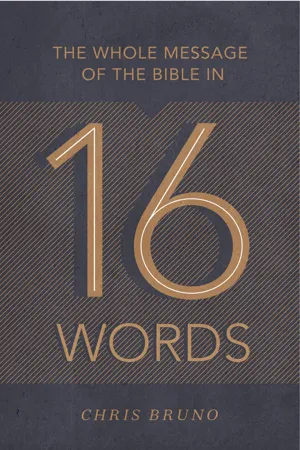
This is a test
- English
- ePUB (mobile friendly)
- Available on iOS & Android
eBook - ePub
The Whole Message of the Bible in 16 Words
Book details
Book preview
Table of contents
Citations
About This Book
16 Key Words. 1 Overarching Message.
At the heart of the Bible is one overarching message: God saving his people through their promised Messiah. This accessible introduction to the main point of the Bible traces the development of sixteen key themes— creation, covenant, kingdom, temple, judgment, and more—from Genesis to Revelation, showing how both the Old and New Testaments come together to declare a single unified message. A concise primer to biblical theology, this book helps readers trace God's unfolding plan of redemption throughout the Bible.
Frequently asked questions
At the moment all of our mobile-responsive ePub books are available to download via the app. Most of our PDFs are also available to download and we're working on making the final remaining ones downloadable now. Learn more here.
Both plans give you full access to the library and all of Perlego’s features. The only differences are the price and subscription period: With the annual plan you’ll save around 30% compared to 12 months on the monthly plan.
We are an online textbook subscription service, where you can get access to an entire online library for less than the price of a single book per month. With over 1 million books across 1000+ topics, we’ve got you covered! Learn more here.
Look out for the read-aloud symbol on your next book to see if you can listen to it. The read-aloud tool reads text aloud for you, highlighting the text as it is being read. You can pause it, speed it up and slow it down. Learn more here.
Yes, you can access The Whole Message of the Bible in 16 Words by Chris Bruno in PDF and/or ePUB format, as well as other popular books in Theology & Religion & Christian Theology. We have over one million books available in our catalogue for you to explore.
Information
Topic
Theology & ReligionSubtopic
Christian TheologyPart 1
The
Foundation
Foundation

1
The End
We begin at the end, because the end actually starts in the beginning. Confused? Just hang with me for a little while, and hopefully you’ll see where we are heading.
If you knew in advance that Frodo survives the journey to Mordor in The Lord of the Rings, but only barely; that Darth Vader is Luke Skywalker’s dad in Star Wars; and that Bruce Willis is dead the whole time in the Sixth Sense, would it ruin these stories? You might think that it would, but according to a 2011 study published in Psychological Science, people actually enjoy stories more when they know the ending.1 What we call “spoilers” could actually be called “improvers”!
Whether that study is right or not, knowing the end of the story of the Bible not only increases our enjoyment of it, but is also crucial for understanding it.
Making All Things New
In one of the last chapters in our Bibles, the apostle John describes the incomprehensible vision that God gave him of the end of history:
And I heard a loud voice from the throne saying, “Behold, the dwelling place of God is with man. He will dwell with them, and they will be his people, and God himself will be with them as their God. He will wipe away every tear from their eyes, and death shall be no more, neither shall there be mourning, nor crying, nor pain anymore, for the former things have passed away.”
And he who was seated on the throne said, “Behold, I am making all things new.” Also he said, “Write this down, for these words are trustworthy and true.” (Rev. 21:3–5)
These words, God tells us, are trustworthy and true. They are the reality we need to cling to in the midst of a confusing world. Because our lives are filled with summer blockbusters, increasingly amazing technological advances, and so many comfortable things, it can often be easy to forget what is really real. But the hope and reality of every Christian is that God himself—not the president, Parliament, or the United Nations—is making all things new. This reality should change the way we see everything in the world—and the way we read everything in our Bibles. We need to see that the end of the Bible is closely connected to the beginning of the story. But we also need to see that the end of the story changes the way we live right now, because the end has already been brought into the present.
Even if you have not read Genesis recently, you probably know the main idea of the creation story. God made the world and everything in it. He created humans in his own image and put them in the garden of Eden. But Adam and Eve doubted God’s kindness to them and wanted to be like him, so they ate the fruit from the tree of the knowledge of good and evil (the only fruit they weren’t allowed to eat). Because of their disobedience, the world and everything in it was broken. And that is basically what we see when we look out the window or turn on the news today. We live in a world where we can still see God’s hand in both the beauty of creation and the creativity of people, but it is also a world filled with broken people looking for some way to fix everything that has gone wrong.
If we really want to understand the story of the world and the story of the Bible, we need to see that God told us about the solution almost as soon as we broke the world. And he started to provide for that solution as soon as he told us about it. In Genesis 3:15, he told Adam and Eve that the seed of the woman would crush the head of the Serpent. In other words, he would undo the fall and restore his good creation. From the very beginning, God was committed to stepping into history to change it, renew it, and make it better than we could ever imagine—for our good and his glory. And that, in a nutshell, is what we mean by eschatology.
When many Christians talk about eschatology, they are thinking about a way to understand biblical prophecy and such events as the rapture, the return of Jesus, and the millennium. More often than not, they have charts and timelines to help graph all of these events, and many of them are more than happy to guess where we are on those timelines and how close we might be to the end of the world. The word eschatology literally means “the study of the last things,” so you can understand why the emphasis is on these sorts of questions.
The return of Christ and the new creation is obviously a big part of what we mean by eschatology. But I have something bigger in mind. When I talk about eschatology, it starts with God keeping his promises, forgiving sin, sending his Spirit, and reigning as King.
So when we talk about the end, we can’t just start with the last page of the Bible. We need to see everything that God has done and is doing to get us to that last page. While we need to see that eschatology is heading toward the end, we also need to see that the end shapes the whole story. In fact, that is how I would define eschatology—the study of God’s work in history to bring the story to his intended end. So when we talk eschatology, we have to start in Genesis.
Eschatology in the Old Testament
Just after Adam and Eve sinned in the garden, God promised that Eve’s offspring would crush the head of the Serpent. In other words, he promised that, through the line of Adam and Eve, he would defeat the Serpent and reverse the fall. Adam and Eve were designed to be God’s representative rulers in the garden—that is a big part of what it means to be made in his image. But they failed to rule as God intended. And because of this, both the human race and creation itself no longer reflect God’s perfect rule over them. We call this the curse.
So a big part of God’s work in history is reestablishing his perfect reign as King over all things. Throughout the Old Testament, we see God working to do just that—first through his people Israel, as he reigned as their King, and then through King David and his descendants—so that he might entrust the rule of creation to them again.
But the Old Testament story is a tragic one. Time and again, God’s people failed to see how he was working to rescue them from their enemies, failed to submit to him as their King, and failed to see how he was going to crush the Serpent (as he promised Adam and Eve) and use them to bless the world (as he promised Abraham).
Already and Not Yet
While the Old Testament gives us hope and hints about God’s work to establish his rule, save his people, and bring history to its ultimate end, it is only when we arrive in the New Testament that we begin to see his eschatological work clearly.
First of all, we see that Jesus talks about the kingdom both as having arrived and still yet to come. He says things like “If it is by the Spirit of God that I cast out demons, then the kingdom of God has come upon you” (Matt. 12:28) and “The kingdom of God is in the midst of you” (Luke 17:21b). But he also teaches us, in the Lord’s Prayer, to pray that God’s kingdom might come (Matt. 6:10). This means there is some aspect of the kingdom that is already present and some aspect that is still not yet fully here. We see this already-and-not-yet reality on display in other places in the New Testament. In fact, almost everything we read in the New Testament has a bit of an already-and-not-yet flavor to it. Have you ever noticed this?
You may have heard a pastor talk about how we have been saved, we are being saved, and we will be saved. This is because our redemption is already and not yet. On the one hand, it’s clear that our redemption as Christians has already happened. Paul says that in Christ, “we have redemption, the forgiveness of sins” (Col. 1:14). On the other hand, he also talks about redemption as a future reality. In Romans 8:23b, he says, “We wait eagerly for adoption as sons, the redemption of our bodies.” In some ...
Table of contents
- Cover
- Newsletter Signup
- Endorsements
- Title Page
- Copyright
- Dedication
- Contents
- Preface
- Acknowledgments
- Part 1 The Foundation
- 1 The End
- 2 God
- Part 2 The Frame
- 3 Creation
- 4 Covenant
- 5 Kingdom
- Part 3 The Superstructure
- 6 Temple
- 7 Messiah
- 8 Israel
- 9 Land
- 10 Idols
- 11 Judgment
- 12 Exodus
- 13 Wisdom
- 14 Law
- 15 Spirit
- 16 Mission
- Where to Go Next
- Notes
- General Index
- Scripture Index